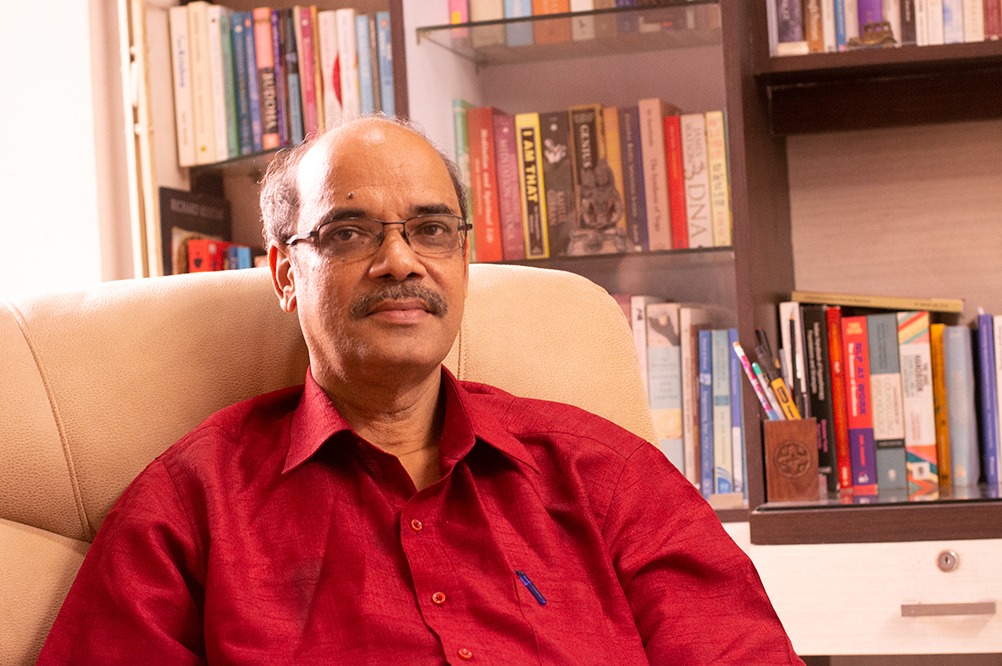Dr Dipankar Patra, psychotherapist, writes candidly about how his journey in his profession was greatly enriched by J Krishnamurti. Read on to uncover the unusual learning that Dr Patra came upon when he started reading the three volume ‘Commentaries on Living’ written by J Krishnamurti.
People may be surprised when I say that my most valuable lessons as a psychotherapist came from J Krishnamurti. To me, he was a master psychotherapist. He would probably not like this statement because throughout his life, he denied any form of authority. For me, he touched the deepest core of my being and helped me evolve as a human being. He also helped me mature as a psychotherapist. It all began from the time I began reading his three volume work titled ‘Commentaries of Living’, a book I have been strongly recommending to psychotherapists, especially those engaged in the art and science of hypnotherapy.
All the different aspects of life have been poignantly touched through the exuberance of an extremely intelligent mind. The writing by Krishnamurti is in the simplest of English and crafted to take one beyond the confines and resistance of the conscious mind. The impact is instantaneously therapeutic and the process is undeniably hypnotic.
The impact of his words is spontaneously ‘trance inducing’. Almost all the writing has a lyrical description of nature and takes one to a state of peacefulness. Once the attention is drawn, Krishnamurti moves promptly to the central aspect of his teaching which focuses on freedom from conditioning. He does this with the tenderness, love, compassion, kindness and poise that a mother would use to discipline a child. The unique writing in the ‘Commentaries on Living’ and elsewhere has helped me to design therapy, especially for those who delight in logic and understanding. The truism in his statements is irrefutable and has qualities of Upanishadic mahavakyas. He is very direct and repetitive in his teachings and his phrases have the quality and weight of proverbs, which I unmistakably use in the form of suggestions in my therapy room.
His was an Ericksonian approach – non-invasive, collaborative, naturalistic. I have often emulated the use of voice and silence that Krishnamurti uses in his speeches, like a master story teller. One has to go inwards to fetch the meaning and weight of his sentences. The rapport is almost immediate and the learnings are universal.
For me, his conversational style of exploring issues together has some quality which is beyond the Upanishadic guru-shishya relationship. Krishnamurti insists on being just a fellow passenger working through issues together. His unhurried, gentle and layered approach is designed to take one to the core of one’s being and establish an immediate rapport. I have also learned to explore issues in totality because incompleteness eventually creates conflicts and contradictions, that lead to suffering.
Krishnamurti’s stress on the individual to effect the first change made me realize the importance of the therapist to work on himself first before attempting therapy on others. Problems find expression in the questions Krishnamurti raises. He teaches us how to frame questions using the power of observation which is devoid of defilement and contamination of thoughts, ideals or beliefs. His essence is one of Sattvic purity and Vedantic oneness, although he is careful not to identify with any form of isms, a quality to be definitely emulated by all practicing therapists. Yes, indeed for me Krishnamurti was a master psychotherapist.


Beautifully written.
Thank you, Gopa.
May be when I am trying to observe myself by observing my own thoughts, repetitive thoughts might not be any more concern….is it so???
Yes, although it is difficult to stop one’s thoughts, there are meditative and Yogic practices which help us to go beyond them. Basically, observing one’ thoughts provide one with a form of dissociation between the thoughts and the thinker. Our shastras talk about it as having a drashta bhav or sakshi bhav, which in English is translated as witnessing consciousness. This helps to address various emotional issues, including reoccurrence of thoughts in the waking state and in dreams.
Pingback:Krishnamurti: My lessons in Psychotherapy – Dr. Dipankar Patra
Well written Dipankarji.
Thank you, Sir
J Krishnamurti is an legend Sir
Getting tips from his work is my favorite too it’s magically inspiring towards spirituality especially silence
Have experience within a little bit by doing Vipaasna still lots to learn 🙏🏽
Yes, his approach was very different and is intended to shake us from our deep conditioned slumber. He is a master craftsman with his speeches also and one needs to learn how to use the voice with the effective use of pauses and spaces between words and sentences. It helped me immensely.
Krishnamurti always encouraged one to address the right way of observation of our thoughts, beliefs, ideals and perceptions and the practice of Vipassana is a great help in this direction. Choice awareness and non judgmental observation helps one to experience true freedom. It also assists one being good therapists.
Yes sir, work on himself is the key and how to frame the question devoid of conditioned thoughts…
Dear dr. Patra,
I noticed that you, like me, are one of the few psychotherapist interested in K. work. I would like to send you an interview with me about my view on K. and my work as a psychotherapist. I would like to send this text to you and would like to receive for that purpose your email address.
Thank you for sending this to me.
Sincerely,